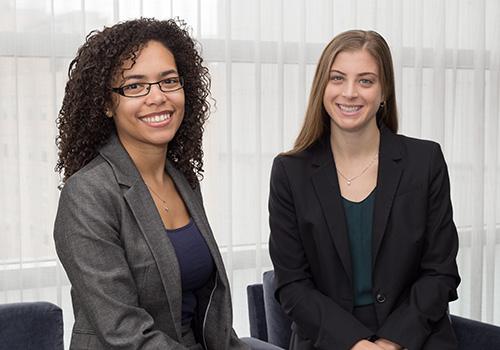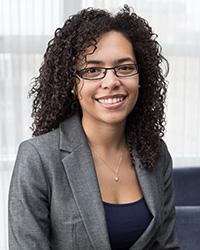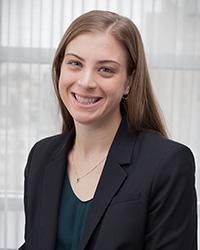Two Columbia Law School Students Awarded Prestigious Skadden Fellowships
Jessica Alcantara '16 Will Work for Black and Latino Communities Facing School Closures; Kirby Tyrrell '16 Will Represent Domestic Violence Victims in New York City
New York, January 14, 2016—Two Columbia Law School students with a commitment to public interest law recently received the opportunity to pursue their passions following graduation as 2016 Skadden Fellows.
| Jessica Alcantara '16, left, and Kirby Tyrrell '16 were both awarded prestigious Skadden Fellowships. |
Jessica Alcantara ’16 and Kirby Tyrrell ’16 were awarded the prestigious fellowship that recognizes the need to fund opportunities for law school graduates who wish to devote their professional lives to representing the poor, the elderly, the homeless, and the disabled, as well as people deprived of their civil or human rights.
Established 28 years ago by the law firm Skadden, Arps, Slate, Meagher and Flom, the Skadden Fellowship Program serves as a “legal Peace Corps” assisting America’s disenfranchised. Fellows work on their own projects at established public interest organizations, and the program pays their salaries and benefits for two years.
“The fellowship helps make public interest jobs happen, because you don’t get hired to do this kind of work directly out of law school,” Tyrrell said. “I was familiar with people who had done Skadden Fellowships, and I was really impressed by the work they were doing and the way it helped them to envision their future efforts.”
The 2016 fellowship class is comprised of 28 graduates and judicial clerks from 15 U.S. law schools. Out of the large number of applications, approximately 100 semifinalists were invited for in-person interviews, and the list of finalists was winnowed down over a couple of months. Applicants were asked about the personal and professional significance of their previous public interest projects, and Alcantara and Tyrrell both informed their proposals with remarkable stories.
Jessica Alcantara ’16
From Washington Heights to Morningside Heights
| Jessica Alcantara '16 |
Alcantara, 29, grew up just north of Columbia Law School, in the Washington Heights neighborhood of northern Manhattan, which she describes as “a very insular Latino community.” Her parents were immigrants from the Dominican Republic, and the family spoke Spanish at home, meaning Alcantara didn’t learn English until she started school. Her father worked in factories and as a custodian at the Javits Center. Her mother didn’t graduate from high school, but received her G.E.D. in the 1990s.
At the age of 11, Alcantara attended a public middle school in Harlem. It was there that she learned of a leadership development program called Prep for Prep that places academically gifted African-American, Latino, and Asian-American students from New York City into private prep schools. Alcantara applied and was accepted.
“For 14 months, I took classes on Saturdays and over the summers,” she said, before receiving admission to Phillips Academy in Andover, Massachusetts. “I realized, ‘Wait, the whole world isn’t like Washington Heights?’”
Alcantara graduated from Phillips and then from Dartmouth College. In the summers, she interned at Lehman Brothers and at Court TV. She also took a position at the Associated Press. Wanting to help people and to travel, Alcantara joined the Peace Corps, working out of a music and arts school in a small town in Azerbaijan, where she ran English conversation clubs, taught Dominican dances, and helped organize a summer arts camp, among other activities. She applied to law schools back home in the U.S., and traveled three hours in a public van to take the LSAT in Tbilisi.
The plight of students in poorly funded schools claimed Alcantara’s attention at Columbia Law School. As part of the Human Rights Internship Program, she spent the summer after her first year in Grahamstown, South Africa, working on a case concerning the lack of furniture in rural schools. When she returned to Morningside Heights, she attended a Law School event featuring alumna Judith Browne Dianis ’92, founder and co-director of the Advancement Project—a national civil rights group with local campaigns tackling educational inequity—and a former Skadden Fellow.
“I thought, I need to look into this organization, because if it’s anything like her, I want to work there,” Alcantara said. She spent the next summer as an intern at the Advancement Project, based in Washington, D.C., and working in the racial justice program of the American Civil Liberties Union.
With her Skadden Fellowship, Alcantara will return to the Advancement Project, where she will partner with the Journey for Justice Alliance to assist black and Latino communities facing school closures.
“We know what’s needed to make good schools—the good schools have guidance counselors, extracurricular activities and [advanced placement] programs, staff and teachers who are qualified. But for some reason we don’t want to put these things in some schools. We’d rather close them.”
Already contemplating her strategy, Alcantara plans to invoke Title VI of the Civil Rights Act—which prohibits discrimination in programs that receive federal funds—and other civil litigation tactics to increase black and Latino students’ access to quality, well-resourced neighborhood public schools. She also wants to ensure that children learning English as a second language have meaningful access to education.
“I know personally the importance of early development,” she said. “Providing opportunities for people early on can set them up for life.”
Kirby Tyrrell ’16
Building Supportive Communities
| Kirby Tyrrell '16 |
When Tyrrell arrived at Columbia Law School, she found a wide array of opportunities for students interested in public interest law—internships, externships, and clinics covering a range of clients and issues, from criminal justice to immigration to gender and sexuality law. Starting in her first year, Tyrrell worked in a clinic run by the New York Legal Assistance Group representing women who had experienced intimate-partner violence.
“My clients were from all over the world, and they faced different situations, but I really loved connecting with them,” recalled Tyrrell, 27. “The work is all client-based. You form meaningful relationships and build trust. You see clients in hard situations, and with your representation, their circumstances improve. That’s inspiring.”
It was the kind of useful, intimate, and uplifting work Tyrrell had been seeking since graduating with a bachelor’s degree from Harvard University in 2010. Growing up in the Boston suburb of Belmont, she was influenced by her mother, a social worker, and her father, a psychologist. Tyrrell knew she wanted a career helping others. Fresh out of college, she worked as an intern in the maternal- and child-health unit of the Clinton Health Access Initiative, but craved hands-on experience in the field. Around this time, Tyrrell read about Tostan, an African community-development organization based in Senegal.
“Their goal is to empower communities, so they have local facilitators who work with communities for several years, teaching about health and human rights and education, and they provide support if the community wants to make changes based on what’s been learned,” she explained. “I reached out to the executive director in an email saying, ‘I love your model. It’s really innovative. This is who I am. Can I work for you?’ And she said, ‘Yes, if you'll move to the Gambia.’”
Working in the small West African country showed Tyrrell that, with the right opportunities and assistance, people can make positive changes to improve their lives. She saw that, through the help of Tostan, some communities chose to abandon traditional practices that violate human rights, like child marriage or female genital cutting. These communities are also able to apply for grants to build wells for clean water, establish businesses, and create microcredit systems.
When she moved back to the U.S., Tyrrell took a job at a global health advocacy and policy group in Washington, D.C., but she missed collaborating with clients. “I had seen things on the policy level, and I knew I wanted to do women’s rights work,” she said. “Law school was the way to figure out how I could do that and have the best impact. I wanted to learn the tools and skills I needed to move forward.”
Tyrrell drew on the strengths and resources of Columbia Law School’s Social Justice Initiatives (SJI), which provides career services for students and graduates interested in public interest and government work. After representing victims of domestic violence in her first and second years, Tyrrell interned for The Legal Aid Society in the South Bronx, working with juveniles facing criminal charges.
“SJI is amazing, and Dean [Ellen P.] Chapnick and Maddie Kurtz ’84 really make wonderful things possible for the students who want them,” Tyrrell said.
To build and support the SJI community, Tyrrell co-founded the Student Public Interest Network (SPIN) with Paul Chander ’15 in 2014. “We took a class together called Lawyering for Change, and the professor, Susan Sturm, was a big influence on us. We wanted a group to support and advocate for public interest law students.” The duo wrote a report on the topic for Gillian Lester, Dean and the Lucy G. Moses Professor of Law, and they held retreats, talks, information sessions, and potluck dinners. SPIN now has almost 200 members.
SJI also helped Tyrrell continue her direct representation work when Chapnick suggested she connect with Her Justice, an organization that provides low-income women in New York City with family, matrimonial, and immigration legal services. Tyrrell met the group’s executive director, Amy Barasch ’96, the former head of the New York State Office for the Prevention of Domestic Violence, and legal director Jennifer DeCarli. “Right away, we began to talk about ideas and projects,” Tyrrell said. “They think creatively about this work and how to reach women who aren’t receiving the assistance they need.”
As a Skadden Fellow, Tyrrell will represent victims of domestic violence, working out of an office she’ll set up at a maternal- and child-health care clinic in Sunset Park, Brooklyn. “The idea is that we can reach women in a place where they’re already going and where they feel safe,” she said. “A huge problem with providing these services is access. Being based there will allow me to reach women in need.”


